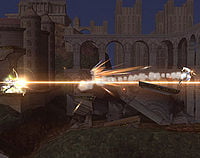Semi-spike: Difference between revisions
No edit summary |
HelloImWario (talk | contribs) mNo edit summary |
||
| Line 1: | Line 1: | ||
{{ArticleIcons|series=y}} | {{ArticleIcons|series=y}} | ||
{{incomplete|no ultimate content}} | {{incomplete|no ultimate content}} | ||
{{Out of date| | {{Out of date|Ultimate}} | ||
[[Image:Semi-spike angles.png|thumb|The shaded angles considered to be semi-spikes. | [[Image:Semi-spike angles.png|thumb|The shaded angles are considered to be semi-spikes.] | ||
[[Image:Sheik Light Arrow.jpg|thumb|An example of a semi-spike; the opponent is sent at an angle that is almost parallel to the ground.]] | [[Image:Sheik Light Arrow.jpg|thumb|An example of a semi-spike; the opponent is sent at an angle that is almost parallel to the ground.]] | ||
A '''semi-spike''' or '''pseudo-spike''' is a type of attack that does not send the opponent directly downward, but instead in a mostly horizontal trajectory which (due to gravity) will quickly turn into a vertical trajectory. This is distinct from a [[meteor smash]], which sends the enemy downwards without a prior horizontal trajectory. Semi-spikes are dangerous as they send targets on the shortest possible path to the blast line, and characters who survive are left below and away from the edge, the worst possible position to [[Recovery|recover]] from. When landing semi-spikes on inclines, there will usually be little to no audible reaction from the character or the audience due to the fact that, like a meteor smash/spike landing on a grounded opponent, the character being hit cannot travel at an angle due to the incline. When [[grab]]bed characters are hit by other characters, they will be semi-spiked. | A '''semi-spike''' or '''pseudo-spike''' is a type of attack that does not send the opponent directly downward, but instead in a mostly horizontal trajectory which (due to gravity) will quickly turn into a vertical trajectory. This is distinct from a [[meteor smash]], which sends the enemy downwards without a prior horizontal trajectory. Semi-spikes are dangerous as they send targets on the shortest possible path to the blast line, and characters who survive are left below and away from the edge, the worst possible position to [[Recovery|recover]] from. When landing semi-spikes on inclines, there will usually be little to no audible reaction from the character or the audience due to the fact that, like a meteor smash/spike landing on a grounded opponent, the character being hit cannot travel at an angle due to the incline. When [[grab]]bed characters are hit by other characters, they will be semi-spiked. | ||
Revision as of 20:49, April 1, 2020
[[Image:Semi-spike angles.png|thumb|The shaded angles are considered to be semi-spikes.]
A semi-spike or pseudo-spike is a type of attack that does not send the opponent directly downward, but instead in a mostly horizontal trajectory which (due to gravity) will quickly turn into a vertical trajectory. This is distinct from a meteor smash, which sends the enemy downwards without a prior horizontal trajectory. Semi-spikes are dangerous as they send targets on the shortest possible path to the blast line, and characters who survive are left below and away from the edge, the worst possible position to recover from. When landing semi-spikes on inclines, there will usually be little to no audible reaction from the character or the audience due to the fact that, like a meteor smash/spike landing on a grounded opponent, the character being hit cannot travel at an angle due to the incline. When grabbed characters are hit by other characters, they will be semi-spiked.
Lists of semi-spikes
- List of semi-spikes (SSB)
- List of semi-spikes (SSBM)
- List of semi-spikes (SSBB)
- List of semi-spikes (SSB4)


